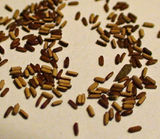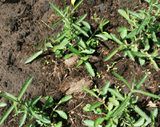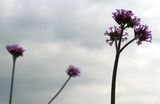Verbena
| Verbena | |
|---|---|

| |
| Common Vervain | |
| Scientific classification | |
| Kingdom: | Plantae |
| Order: | Lamiales |
| Family: | Verbenaceae |
| Genus: | Verbena |
| Species: | Verbena officinalis' |
Verbena officinalis, also called Common Vervain or Common Verbena, is a perennial herb native to Europe, but also cultivated in North America. The plant prefers limey soils. It is mostly grown for its ascribed powerful medicinal properties.
In common names this plant is often associated with iron. For example, from German it translates as 'true ironherb,' from Dutch as 'ironhard,' from Danish as 'medical ironwort.' The stems of this plant do indeed give the impression as if they were made from iron.
In ancient times Common Vervain was ascribed supernatural properties. It also has long been used as a medicinal plant. As a tea it is said to help against nervousness and insomnia, to promote secretion of milk, to induce abortion, and to function as a possible sex steroid analogue. Vervain is also one of the original 38 Bach flower remedies prescribed against over-enthusiasm.
Related to its supposed magical qualities, the plant has been called 'tears of Isis' in ancient Egypt. In the early Christian era it was stated that the plant had been used to staunch Jesus' wounds after his removal from the cross, and it got the name 'Holy Herb.' Apparently the oil has been used in ointments to repel demonic illnesses.[1]
Verbena bonariensis (related to Verbena officinalis, which is the plant used as medicine) is suspected of causing sickness and abortion in cattle.[2] Verbena bonariensis self-seeds easily. It has naturalized in favorable habitats in several regions of the world. In Washington State it's on a watchlist for invasive species.
Garden Journal
April 2012 - Sowing Verbena bonariensis seeds.
June 18, 2012 - The plants were put in the soil a few weeks ago and grow well in a compost-rich soil, sun for 90 % of the day.
July 18, 2012 - The plants (Verbena bonariensis) are now ca. 1 meter high and have many flowers
References
- ↑ Verbena officinalis Wikipedia
- ↑ Verbena bonariensis Medical Dictionary
See also
External links
- Verbena bonariensis
- Verbena officinalis Wikipedia



